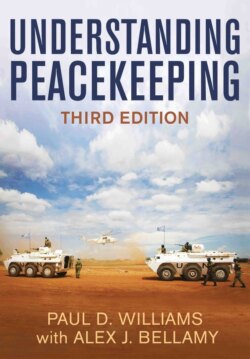Читать книгу Understanding Peacekeeping - Alex J. Bellamy - Страница 26
Peacekeeping as liberal imperialism
ОглавлениеAt the opposite end of the political spectrum from cosmopolitanism, an alternative approach conceptualized UN peacekeeping as a neo-imperial tool of the great (Western) powers designed to pacify the global periphery. Developed most fully by Philip Cunliffe, this view argues that, as a key mechanism of military power projection, UN peacekeeping ‘enable[s] wealthy and powerful states to suppress and contain conflict across the unruly periphery of the international order without the encumbrance of open-ended political and military commitments’ (2013: 2). The great (Western) powers do this by using surrogates and proxies to keep order. UN peacekeepers have thus become agents of a system of ‘imperial multilateralism’, which Cunliffe describes as the ‘highest form of liberal imperialism’ (2013: 2, 23, 28). This approach sees UN peacekeeping as the most recent phase of ‘a historic tradition of imperial security’ (2013: 27), pointing out how the interests of Western colonial powers were important in shaping some of the UN’s key early operations in places such as Suez and Congo. More recently, Cunliffe argues, the Security Council’s three Western members have leveraged peacekeeping operations to promote their interests, for example in West Africa and Haiti. He also notes the clear echoes between some contemporary UN peacekeeping mandates and those of earlier imperial policing operations (see also Duffield 2001; Pugh 2004). This is not that different from arguments made by some self-confessed liberals who also saw many post-Cold War peacebuilding missions trying to ‘transplant the values and institutions of the liberal democratic core into the affairs of peripheral host states’ (Paris 2002: 638).
Critics of this approach contend that, while they have increased their influence over UN peacekeeping mandates since the end of the Cold War, the P3 are not as dominant as the concept of imperialism implies (Gowan 2015). Neither the Security Council nor Western states can dictate the processes or outcomes of UN peacekeeping, let alone missions conducted by non-UN actors such as the African Union and the continent’s regional arrangements. Instead, the contemporary reality is not imperial dominance but messy crisis management with multiple actors that can influence the course of events, including host states, major T/PCCs, the UN Secretariat, and regional organizations.
